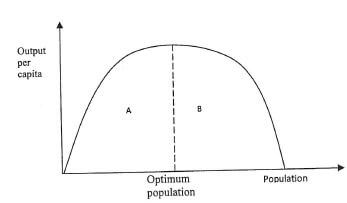Instructions to Candidate
- Write your name and index number on the spaces provided.
- Sign and write the date of examination on the spaces provided.
- Answer ANY FIVE questions. All the answers should be written on the spaces provided.
- This paper contains 3 printed Pages.
- The candidate should check the question paper to ascertain that all pages are printed as indicated and that no question is missing.
- Candidates should answer the questions in English:
QUESTIONS
-
- Ordinary shares and debentures are both sources of capital to limited liability companies. Explain FIVE differences between the two. (10 marks)
- Explain FIVE factors that may lead to demand pull inflation. (10 marks)
-
- The following Table shows the percentage contribution in each of the three levels of production in generating INCOME to a country.
| FACTORS OF PRODUCTION |
PRIMARY |
SECONDARY |
TERTIARY |
| % INCOME CONTRIBUTION |
55 |
30 |
15 |
Explain FOUR factors that may have led to a higher proportion of income contributed at the primary level. (8 marks)
- The following trial balance was extracted from the Ledgers of Ashioya's electronics business on 30th April 2010.
Ashioya's Electronics
Trial Balance
As at 30th April 2010 |
| TITLE OF ACCOUNT |
DEBIT (Dr) SHS. |
CREDIT(Cr) SHS. |
| Equipment |
90,000 |
|
| Motor vehicle |
250,000 |
|
| Sales |
|
320,000 |
| Returns Inwards |
12,000 |
|
| Purchases |
160,000 |
|
| Returns outwards |
|
34,500 |
| Stock (1/5/2009) |
86,400 |
|
| Electricity |
12,900 |
|
| Rent |
18,300 |
|
| Discount received |
|
19,300 |
| Salaries |
36,000 |
|
| Insurance |
14,500 |
|
| Cash at bank |
34,500 |
|
| Debtors |
63,000 |
|
| Capital |
|
374,400 |
| Creditors |
|
29,400 |
| TOTAL |
777,600 |
777,600 |
Stock on 30th April 2010 was valued at shs. 77,000.
Prepare:
- A trading profit and Loss account for the year ended 30th April 2010 (8marks)
- A balance sheet as a 30th April 2010. (4marks)
-
- Explain five factors that can lead to unfavourable balance of payment. (10marks)
-
MAMBO TRADERS
BALANCE SHEET
As at 1" June 2009 |
| |
Sh |
|
Sh |
| Equipment |
160,000 |
Capital |
272,000 |
| Stock of goods |
90,000 |
creditors |
40,000 |
| Bank |
52.000 |
|
|
| Cash |
10.000 |
|
|
| |
312.000 |
|
312.000 |
During the first week of June the following transactions took place in the business: 2009
- June 2: Mambo introduced additional funds into the business sh. 38,000
- June 3: Purchased a motor vehicle from Mashalls Ltd worth sh. 200,000 on credit
- June 5: Paid a creditor sh. 6000 cash
- June 6: Sold goods on credit to Anita sh. 25,000
- June 7: Bought equipments worth sh. 50,000 by cheque
Prepare the balance sheet of Mambo traders as at 7 June 2009 to record the above transactions (10marks)
-
- Explain FIVE ways in which the central bank acts as a banker to the government (10 Marks)
- The following were the balances of Maramoja traders as at 1 Jan 2010. Cash sh. 40,000, bank overdraft sh. 17,000. During the following months, the following transactions took place:
- Jan 2nd Musau a debtor settled his account of sh. 32,000 by cheque of sh. 30,000
- 4th paid salaries and wages amounting to sh. 16,000
- 10th Deposited sh. 12,000 into the business bank account from the cash till.
- 14th Settled Wayua's account of sh. 40,000 and she was allowed a discount of 1% through a cheque.
- 16th Deposited sh. 56,000 in the bank from private sources.
- 17th sold goods for cash sh. 24,000
- 20th Mutua, a debtor, settled his account by a cheque of sh. 16,000 having been allowed a discount of 2%
- 24th Purchased furniture sh. 10,400 paying by cheque
- 26th received sh. 7,200 cash from Odhiambo
- 30th Banked all the available cash except only sh.3,200
Required: Prepare a 3 column cashbook for Maramoja traders. (10 marks)
-
- As a County Governor, explain FIVE ways in which the National Income statistics will be of benefit to you (10 marks)
- The diagram below represents the population and output per capita of a certain country. Explain any five challenges to the country if her total population is found at the part marked B. (10marks)

-
- Explain FIVE methods of price determination of products other than price mechanism in a market. (10 marks)
- Explain FIVE reasons why the Kenya government must collect taxes from its citizens. (10 marks)
